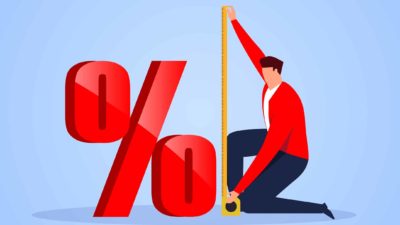So it's finally happened.
After more than 11 years, the Reserve Bank of Australia has increased the cash rate.
Incredibly, there was an entire generation of investors and homeowners who have never directly experienced interest rates going up.
With more rate rises expected later this year, it's an uncomfortable feeling that they will have to get used to.
"We expect another increase in the cash rate in June (probably of 0.25% but it could be up to 0.4%), a rise in the cash rate to 1.5% by year end, and to 2% next year," said AMP Ltd (ASX: AMP) chief economist Dr Shane Oliver.
For those reading The Motley Fool, I'm sure you're keen to find out what the consequences are for ASX shares.
While no one has a 100% accurate crystal ball, some experts have looked back at past situations to figure out what might happen in 2022.
Rates and shares: not a simple relationship
Intuitively, one might think rising rates will cause the share market to fall. People have less money to spend or invest, so less demand for goods, services, and stocks.
But historically it hasn't been as simple as that, according to Oliver.
"There is an ambiguous relationship between rising interest rates and the Australian share market," he said on the AMP blog.
"While higher rates place pressure on share market valuations by making shares appear less attractive, early in the economic recovery cycle this impact is offset by still improving earnings growth."
Certainly, on some occasions, share prices have fallen with increasing rates. But other times, the All Ordinaries Index (ASX: XAO) has done the opposite.
"For example, between 2003 and 2007, shares went up as interest rates rose, with shares only succumbing in 2008 after multiple rate hikes over several years and with the GFC."
ASX shares to tread water in 2022
Oliver suspects 2022 will be one of those times when ASX shares will not plunge because of interest rates alone.
"Firstly, rising rates from a low base are normally not initially bad for shares, as they go with improving economic conditions," he said.
"Secondly, rising interest rates are only really a major problem for shares when rates reach onerous levels (i.e. above "normal"), contributing to an economic downturn."
Also, even if the RBA cash rate hits 1.5% by the end of the year, returns paid out of bank deposits would still be less than 2%. This would mean plenty of demand for shares from investors seeking decent yields.
"Finally, given the high short term correlation between Australian shares and US shares, what the [US Federal Reserve] does is arguably far more important than local interest rates," said Oliver.
"And this is perhaps a bigger risk given higher inflation in the US."
While rising rates may not bring down the stock market on its own, Oliver admitted it will be a bumpy ride.
"An environment of rate hikes will likely result in a continued period of volatility for shares."
Has the RBA lost credibility?
T Rowe Price Group Inc (NASDAQ: TROW) associate portfolio manager Scott Solomon felt blindsided by the magnitude of RBA's move on Tuesday.
"The Reserve Bank of Australia pivoted [to] hawkish and did so with a bang, raising rates to 35 basis points, which was higher than what [the] market anticipated," he said.
"This comes after more than 12 months of dovish commentary — including a very firm view of no hikes until 2024 — and underwhelming economic forecasts."
For Solomon, the central bank has lost credibility because of this.
"It's very difficult to foresee RBA's future actions based on its statements and forecasts," he said.
"The market had been screaming about factors that would imply and demand potential rate hikes and the RBA had in the past responded with a call for patience, and grim economic forecasts followed by reminders of how inflation is different in Australia."
He added the RBA must now further address market concerns to calm a volatile situation.
"I think what the market wants is an answer to what caused the RBA to finally flip the switch."









